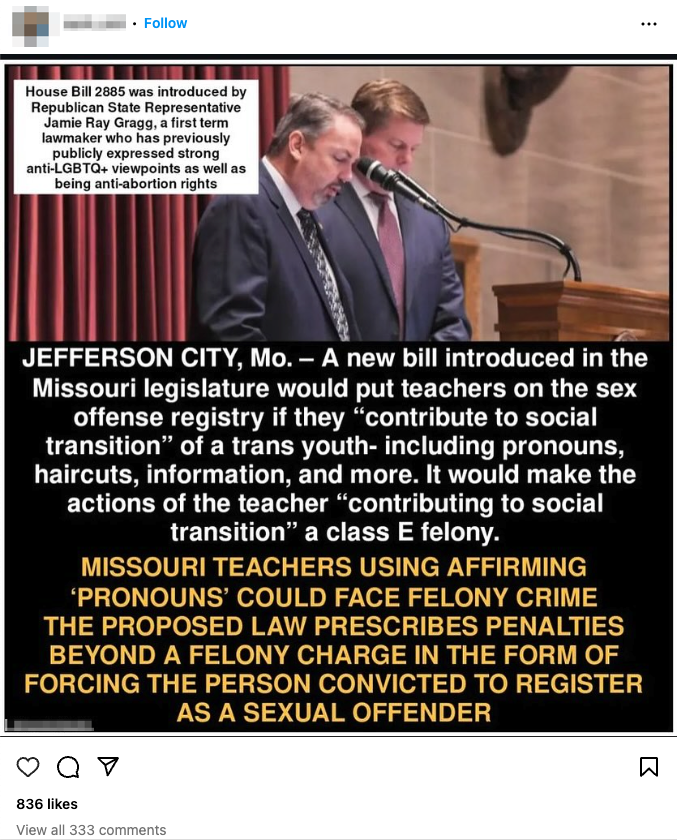

Our only agenda is to publish the truth so you can be an informed participant in democracy.
We need your help.


(Shutterstock)
A bill introduced in the Missouri Legislature would make it a felony for teachers to "support" a transgender student’s "social transition." If convicted, teachers would be required to register with the state as a sex offender.
A "social transition" is the process by which transgender people adopt new names, new pronouns, or change their clothes or hair style.
The bill’s meaning of the term "support" is not clear. Some legal experts disagree on whether it would include the use of gender-affirming pronouns.
Could a proposed Missouri law imprison teachers as sex offenders for using transgender students’ preferred gender pronouns?
A March 3 Instagram post claimed, "A new bill introduced in the Missouri Legislature would put teachers on the sex offense registry if they ‘contribute to social transition’ of a trans youth — including pronouns, hair cuts, information, and more."
That post presents a largely accurate summary of the proposed legislation.
The bill, House Bill 2885, would make providing "support … to a child regarding social transition," while acting in "his or her official capacity as a teacher or school counselor" a Class E felony under Missouri law. What would constitute "support" is not clearly defined in the bill. Legal experts said it could include the use of gender-affirming pronouns or names.
Class E are the lowest level felonies in Missouri, punishable by up to four years in prison. Other felonies in this category include counterfeiting, incest, involuntary second-degree manslaughter and child abduction.

(Screenshot from Instagram)
If teachers were convicted of "contributing to social transition," the bill would require them to register as Tier 1 sex offenders, the lowest of three tiers on the state’s sex offender registry. Other offenses that require Tier 1 registration include child pornography possession, sex with an animal and sexual abuse of an adult.
Rep. Jamie Gragg, R-Ozark, introduced the bill Feb. 29, one of more than 30 bills filed in Missouri that target LGBTQ+ communities, according to the American Civil Liberties Union.
Aaron Schekorra, executive director of an LGBTQ+ center in Springfield Missouri, told KYTV, a local TV station, that he doubts this bill will become law. But it drew widespread attention amid contentious political rhetoric focused on schools and LGBTQ+ rights.
The bill defines "social transition" as "the process by which an individual adopts the name, pronouns, and gender expression, such as clothing or haircuts, that match the individual’s gender identity," and not the sex assigned at birth.
The bill would prohibit support of a student’s social transition, "regardless of whether the support is material, information, or other resources," and would impose criminal penalties.
The law's definition of "social transition" lines up with how the medical community defines it. Social transition is the first step that many transgender youth and adults take in the process of recognizing their gender separate from that assigned to them at birth. It is distinct from a medical transition which begins only after puberty’s onset and can involve medications such as puberty blockers, hormones, and in rare cases in older teenagers, surgery.
What constitutes "support" is not defined, and Gragg did not respond to PolitiFact’s questions about its meaning.
Is support restricted to physical materials such as books or pamphlets? Or does it have a plainer meaning — such as offering encouraging words or complying with a student’s request to use specific pronouns?
Marcia McCormick, a St. Louis University law professor, told PolitiFact in an email that she understands the bill as inclusive of "any support" of a student’s adoption of a name, pronouns, or appearance norms connected with a gender that differs from the student’s sex assigned at birth — meaning using certain pronouns would violate the law.
Chad Flanders, another St. Louis University law professor, said his reading was less clear. Asked whether the bill applies to teachers who use transgender students’ preferred pronouns, he said, "I certainly don't think that the language in the statute rules that out."
Even if a court interprets "support" narrowly to mean information and resources, teachers may be wary, and any speech may be chilled, experts said.
Gragg told KYTV that LGBTQ+ literature and signs would "fall into that same category," of support, but he did not specifically address using pronouns.
This law is part of a larger, nationwide Republican effort to stop conversations about sexuality and gender identity in schools and classrooms.
"This bill was created and really submitted to help parents and families and to help teachers," Gragg told KYTV. "I talk to parents every day who are frustrated with things that kids are being taught in school."
Such legislation is often based on concerns that conversations about sexuality and gender identity are a form of "grooming" or sexual abuse. Grooming, however, refers to a process or behaviors adults use to make it easier to sexually abuse children.
Experts say talking about gender identity and sexual orientation in the classroom, or using gender-inclusive reading material and lesson plans, is not considered "grooming," because it is done without intent to sexually abuse a child.
"Sex crimes are very serious," said Elizabeth Jeglic, a psychology professor at John Jay College of Criminal Justice who studies sexual violence. "When we conflate issues regarding gender identity with sex crimes, it really diminishes our ability to advocate on behalf of these children and to develop policies and procedures to protect them."
In Missouri, Tier 1 sex offenders must remain on the registry for 15 years, but can petition for removal after 10 years. Anyone convicted of a sexual offense in Missouri cannot live within 1,000 feet of a school, or be present within 500 feet of a school unless they are the parent of a student there.
Sex offenders registries date back to the 1940s, instituted primarily as an information tool for law enforcement about who may present a risk to the public, said Andrew Harris, a professor of criminology at the University of Massachusetts Lowell. Federal laws passed in the 1990s now require that states make some of this information public.
Gragg told KYTV that "there have to be some repercussions of discussing things of a personal nature with students that we shouldn’t be teaching or shouldn’t be talking with them about."
But experts said the categorization of "support" of social transition as a sexual crime was inappropriate.
An Instagram post claimed a Missouri bill "would put teachers on the sex offense registry if they ‘contribute to social transition’ of a trans youth — including pronouns, hair cuts, information, and more."
It is accurate that the bill would make it a felony for a teacher to "support" a transgender student’s "social transition." Teachers would have to be charged with and found guilty of the crime before being required to register as a sex offender.
The bill is unclear whether using gender-affirming pronouns for transgender students would constitute "support" of social transition under the law, though legal experts believe it is possible.
Based on the information available at the time of publishing, the statement is accurate but needs clarification. We rate it Mostly True.
Interview with Andrew Harris, Professor of Criminology and Justice Studies at UMass Lowell, March 4, 2024
Interview with Chad Flanders, Law Professor at St. Louis University, March 6, 2024
Email interview with Marcia McCormick, Law Professor at St. Louis University, March 4, 2024
Email interview with Kelly Socia, Professor of Criminology and Justice Studies at UMass Lowell, March 5, 2024
Interview with Elizabeth Jeglic, Professor of Psychology at John Jay College, March 6, 2024
Pink News, "Missouri bill could see teachers who support trans students jailed and placed on sex offenders register," March 4, 2024
KYTV, "Missouri bill would require teachers and counselors to register as sex offenders if they assist a student’s social transition," March 3, 2024
ABC News, "Missouri bill would convict teachers of felony, put on sex offender list for trans support," March 5, 2024
Fox News, "Missouri bill would require educators to register as sex offenders if they encourage transgender students," March 4, 2024
Instagram Post (archived), March 3, 2024
Missouri State Legislature, "House Bill No. 2885," Feb. 29, 2024
Missouri State Legislature, "House Bill No. 2885 Summary," accessed March 7, 2024
Missouri DWI & Criminal Law Center, "Felonies in Missouri," accessed March 6, 2024
Carver & Associates, "Complete Guide to Felonies in Missouri," accessed March 7, 2024
Revised Statutes of Missouri, "Section 557.021," accessed March 6, 2024
Missouri State Highway Patrol, "Sex Offender Registry Fact Sheet," accessed March 6, 2024
Revised Statutes of Missouri, "Section 589.414," accessed March 6, 2024
Missouri House of Representatives, "HB 2885," accessed March 6, 2024
American Civil Liberties Union, "Mapping Attacks on LGBTQ Rights in U.S. State Legislatures in 2024," March 5, 2024
Los Angeles Blade, "Missouri teachers using affirming 'pronouns' could face felony crime," Feb. 29, 2024
PolitiFact, "Is all gender-affirming care for children ‘experimental’? Experts say no," Jan. 17, 2023
Planned Parenthood, "What Do I Need to Know About the Transitioning Process?," accessed March 6, 2024
PolitiFact, "‘Don’t say gay’ vs. ‘parental rights': Fact-checking claims about Florida’s HB 1557," March 23, 2022
PolitiFact, "Why it’s not ‘grooming’: What research says about gender and sexuality in schools," May 11, 2022
Human Rights Campaign, "Lesson Plans to Create LGBTQ+ Inclusive Classrooms and Schools," accessed March 7, 2024
Revised Statutes of Missouri, "Chapter 566 Sexual Offenses," accessed March 6, 2024
Revised Statutes of Missouri, "Section 566.147," accessed March 6, 2024
Revised Statutes of Missouri, "Section 566.149," accessed March 6, 2024
Office of Sex Offender Sentencing, Monitoring, Apprehending, Registering, and Tracking, "Legislative History of Federal Sex Offender Registration and Notification," accessed March 7, 2024
Congress.gov, "H.R.1683 - 105th Congress (1997-1998): Jacob Wetterling Crimes Against Children and Sexually Violent Offenders Registration Improvements Act of 1997," 1997
Cornell Law School, "Megan's Law," Nov. 2021
Human Rights Watch, "US: Sex Offender Laws May Do More Harm Than Good," Sept 11, 2007
Justia, "Smith v. Doe :: 538 U.S. 84 (2003)," 2003
In a world of wild talk and fake news, help us stand up for the facts.
